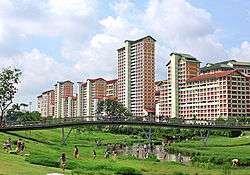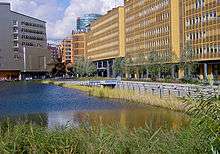Ramboll Studio Dreiseitl
Ramboll Studio Dreiseitl is one of the leading landscape architecture practices of Germany[1] specialising in the integration of art, urban hydrology, environmental engineering, and landscape architecture within an urban context.[2] The practise was founded in 1980 by the German landscape architect Herbert Dreiseitl with a goal to promote sustainable projects with a high aesthetic and social value.[2] Today it has offices in Germany, Singapore and Beijing.[3] In May 2013, Atelier Dreiseitl (now Ramboll Studio Dreiseitl) GmbH formed a new partnership with the international engineering consultancy, the Ramboll Group A/S, based in Copenhagen.[4]

Profile

The multidisciplinary practice seeks to raise awareness of the social and ecological value of water in urban design. The scope of the practice's work includes strategic catchment-based urban masterplans, urban parks, rivers, civic space and water playgrounds. Over the past 30 years, Ramboll Studio Dreiseitl has accumulated experience in technical water systems, including water storage, treatment and reuse, retention and infiltration techniques, grey and black water systems, climatisation and green roofs.[2]
Ramboll Studio Dreiseitl has been described as “the hidden champion of the German design scene”.[5]
Projects

Ramboll Studio Dreiseitl are responsible for the waterscape on Potsdamer Platz in Berlin.[6] Water was central to Renzo Piano and Christoph Kohlbecker's original design, but it was Ramboll Studio Dreiseitl that conceived and developed the scheme for rainwater harvest, circulation and display and created the many opportunities for engagement with water.[7] The scheme is one of the largest urban rainwater harvesting projects in the world[8] and in 2011, it became one of the first city quarters to be retrospectively awarded the DGNB Certificate of the German Sustainable Building Council (DGNB) in silver.
Another major project in Germany is Arkadien Winnenden, the ecological city design which was named winner of the Green Dot Award ‘Build’ category in 2011. The firm turned the abandoned factory site into an eco-friendly development which combines dense layout with green space, includes permeable paving and waterways which provide natural flood control and a lake which filters rainwater.[9]
In 2018 Ramboll Studio Dreiseitl was awarded the German Design Award in the category "Urban Space an Infrastructure" for their design and planning of the Hafen Offenbach[10] [11]in Offenbach am Main, Germany. Studio Dreiseitl has transformed the initial urban plan by reconnecting public open spaces with their scenic context, creating a liveable as well as ecologically enriching neighbourhood. This project is one of the great examples of integrating great design into built reality.[12]
In Asia, projects include the blue green infrastructure in the Tianjin Cultural Park near Beijing and the water strategy for the central catchment for the city of Singapore, together with the engineers CH2M Hill, as well as the design of the 60ha Bishan-Ang Mo Kio Park.[6] The rehabilitation of the previously concreted Kallang River (which became a dangerous torrent in the rainy season)[13] employed techniques of water collection and flood control which were entirely new to Singapore. Ramboll Studio Dreiseitl built a test area and held workshops to explain the concepts. The designers gave the river gentle banks and recycled the concrete from the old drainage channel to create stairs.[3] Now Bishan Park is one of the most popular parks in Singapore, where people can have a new and direct connection to nature.[13] In 2012, the design was awarded the Presidents Design Award Singapore[14] and the World Architecture Festival “Landscape of the Year”.[15]
Project listing
- Bishan-Ang Mo Kio Park – Singapore
- Potsdamer Platz – Berlin, Germany
- Arkadien Winnenden – Germany
- Tianjin Cultural Park – China
- Holalokka – Oslo, Norway
- McLaren Technology Centre – London, UK
- Pforzheim Water Playground – Germany
- Tanner Springs Park – Portland, USA
- Lanferbach – Gelsenkirchen, Germany
- Maybach Centre of Excellence – Sindelfingen, Germany
- River Volme Renaturation – Hagen, Germany
- City Hall Green Roof – Chicago, USA
- Heiner-Metzger-Platz – Neu-Ulm, Germany
- Residential and commercial complex Prisma – Nuremberg, Germany
- Hafen Offenbach – Offenbach am Main, Germany
Selected awards
2012 German Urban Planning Award – BUGA Koblenz, Germany
2012 President's Design Award – Bishan-Ang Mo Kio Park, Singapore
2012 WAF Landscape of the Year – Kallang River Bishan-Ang Mo Kio Park, Singapore
2011 Green Dot Award Ecological City – Arkadien Winnenden, Germany
2011 LivCom Environmental Best Practice Eco Quartier – Pfaffenhofen, Germany
2011 LivCom Award for Liveable Communities – Pfaffenhofen, Germany
2011 BCA Greenmark “Platinum” Award for New Parks – JTC CleanTech Park, Singapore
2011 DGNB Silver Sustainable City District – Berlin Potsdamer Platz, Germany
2002 ASLA Merit Award – Chicago City Hall Green Roof, USA
2001 Earth Society Foundation “Environmental Award” – Solar City Linz, Austria
1989 United Nations “Best Practice Award” – Solar City Linz, Austria
See also
- Sustainable city
- Green Infrastructure
- Water-sensitive urban design
- Sustainable urban drainage system
- Low-impact development (Canada/US)
References
- Yudelson, Jerry (2009). Green Building Trends: Europe. Washington DC: Island Press. ISBN 978-1597264778. Page 23.
- Loft Publications (2009). Sketch Landscape. Page One Publishing, Singapore. Page 270.
- Rinaldi, Bianca Maria (2013). The Soft Sell. Landscape Architecture Magazine, page 80.
- "Company Overview of Atelier Dreiseitl GmbH". investing.businessweek.com. Bloomberg Businessweek. Retrieved October 12, 2014.
- Tröster, Christian (October 2, 2012). "Architektur-Spektakel in Singapur: Vom Bauhaus zum Wowhaus". spiegel.de (in German). Der Spiegel. Retrieved October 12, 2014.
- "Ramboll buys sustainable cities consultancy". theconstructionindex.co.uk. April 30, 2013. Retrieved October 12, 2014.
- Brown, Brenda J (2001). Harvesting What You Can’t Hold Tight. Landscape Architecture Magazine, page 68.
- Benson, J. Roe, M (2007). Landscape and Sustainability. Taylor & Francis: London. Page 228.
- Hattam, Jennifer (March 24, 2012). "Award-Winning German Development Aims To Be 'The World's Most Sustainable Neighborhood'". treehugger.com. Retrieved October 12, 2014.
- "Hafen Offenbach". www.offenbach.de (in German). Retrieved 2019-02-27.
- "Hafen Offenbach". Vimeo. Retrieved 2019-02-27.
- "News | German Design Award – Ramboll Studio Dreiseitl". www.dreiseitl.com. Retrieved 2019-02-27.
- Nagel, Britta (April 14, 2013). "Oasen in der Megacity". welt.de (in German). Welt am Sonntag. Retrieved October 12, 2014.
- "President's Design Award 2012 – Bishan-Ang Mo Kio Park". designsingapore.org. Retrieved October 12, 2014.
- "Project in Detail – Kallang River Bishan Park". worldbuildingsdirectory.com. Archived from the original on October 16, 2014. Retrieved October 12, 2014.